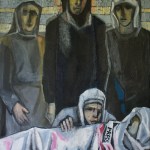
Dear audience,
I am delighted to join artist Awkshi in opening the exhibition of our artist Abed Abdi, because several years ago, we used to look at Abed lying on the ground, doodling like a child, making what he called “drawings.”
But today, we look up to Abed Abdi — a painter forging his path in the art world with great strides, contributing to laying the foundations of Arab art in Israel.
Abed Abdi is among those artists who believe art is not for art’s sake, but for humanity.
When we attempt to interpret his work, we cannot do so through old, traditional measures — for an artwork is not explained the way we explain grammar or writing.
The artist is the artist of the people — bearing immense responsibilities, among them inspiring enthusiasm in times of despair.
He is not a photographic machine, nor merely eyes and ears — the artist is far greater than that.
He is a politically conscious being, alert to everything happening in his country and the wider world.
The painter does not create art to decorate walls, but as a means of confronting evil and defending humanity.
After a long period during which Palestinian Arab art was limited to hobbyists, copies of famous paintings, or landscapes, Abed Abdi, the Arab-Israeli painter, together with his fellow Palestinian artists, emerged to present a new creativity — blending Arab ornamentation with realism, rooted in the issues, pains, aspirations, and hopes of their communities.
They no longer depict women, people, children, trees, or skies as distant, lifeless objects, but as symbols shaped by lived experience and awareness.
The politically aware artist leaves his thoughts within his paintings — his ideas and emotions inevitably reflect in his art.
These qualities are evident in Abed Abdi’s black-and-white paintings before us today, in which we find the story of our people — their tragedy and hope — and sense the artist’s political consciousness in his figures, his landscapes, and his compositions.
We hear the cry of hope, the sigh of endurance, and the whisper of optimism.
Abed Abdi is not only gifted, aware, and alert to the world around him — he is also well-trained, having studied art from the beginning of his career alongside Israeli colleagues, and later at the Academy of Fine Arts in Dresden, East Germany.
His political insight and cultural depth have shaped him into a people’s artist — a realist artist who lives among his people, even when in solitude, carrying within him the ideas and themes he strives to express through his art.
We wish our painter Abed Abdi continued creativity and success in advancing his art — art that he has chosen to be a weapon against evil and a defense of humanity, looking forward to a brighter and more peaceful future.



















